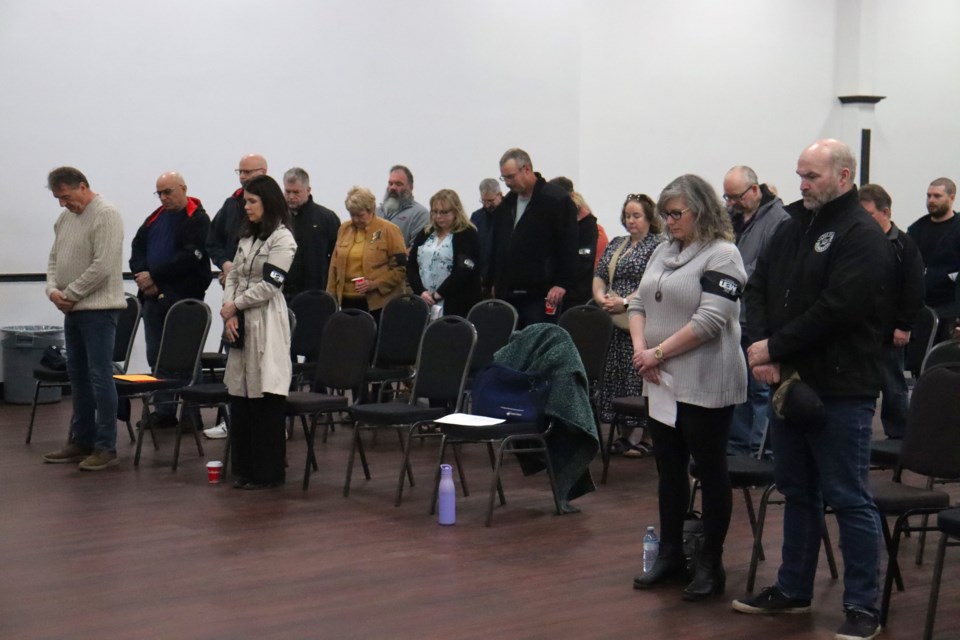Workers and union members held a moment of silence inside The Queen of Hearts Club this afternoon in recognition of the National Day of Mourning.
Acknowledged every year on Apr. 28, the day honours workers who have been killed or injured in the workplace.
The Sault Ste. Marie District Labour Council and its affiliates gathered on Dennis Street to hold a remembrance ceremony before several speeches and a round table concluded Sunday’s programming.
In Canada, approximately 1,000 workers have been killed and 300,000 people have been affected by injury or illness, according to organizers.
Five people in the Sault Ste. Marie and surrounding area lost their life last year due to work-related incidents, including a young father who was killed in an industrial accident at Algoma Steel in June 2023.
There were 239 total deaths in Ontario.
Michele McCleave-Kennedy, an executive on the SSMDLC, told SooToday those numbers are alarming and unacceptable.
“We’ve seen the ten-year stats through WSIB, and the numbers aren’t going down,” she said. “They seem to be trending up for a bit and down for a bit. We’re still having a significant number of workers who have been killed or injured in Ontario.”
“As we see the decrease in funding in public services, we’re seeing an increase in injuries in public service,” she added. “Is it a direct correlation? In my mind, yes. In the government’s mind, probably not. But that’s what we’re seeing, and the trend isn’t going down.”
In recent years, McCleave-Kennedy and her colleagues are noticing other worrisome trends that aren’t just impacting jobs in manual labour.
She said the public service sector, such as education and healthcare, has witnessed a dramatic uptick in injuries. Locally, the labour council estimates there are hundreds of injuries occurring every month.
The Algoma Elementary Teachers' Federation of Ontario reported 77 per cent of their staff have witnessed or experienced violence.
“Never in Sault Ste. Marie before have we had to worry about locking our doors downtown, now we’re seeing downtown workers being assaulted by people on the street,” McCleave-Kennedy said. “Never before has there been metal detectors at our hospital to stop workers from being assaulted as people come into emergency. Never before have we seen education workers wearing Kevlar and spit shields because they’re getting hurt at work.”
“These are jobs we never had to be concerned about before, and now that’s been the issue,” she added. “We need to look at different training, and how do we as a society push forward against the things that are happening.”
Following the formal portion of Sunday’s proceedings, local workers formed a roundtable and discussed how they can promote safety in the workplace going forward.
“We’re hoping to get some solutions from workers,” McCleave-Kennedy said. “We want to have conversations where workers feel comfortable to talk about their issues so we can collectively come together and move those things forward.”
While various job sectors have become more technologically advanced, especially since the pandemic, McCleave-Kennedy suggested avoiding virtual training when possible could be a solid first step in preventing injuries.
She also noted they’re finding non-unionized workers are getting injured more often, which may point to misses in training procedures or fears of speaking up.
“If you’re trying to tell me how to block someone from punching or hitting me with something, and you’re showing that to me on a screen, it’s going to be way more effective in person,” she said. “I think we need to get back to more in person training.”
“If you’re in a non-union position, sometimes the fear of reprisal is what stops workers from reporting,” she added. “We’re hoping to give those people a voice and will be able to push for changes that keep all workers safe.”
Guest speakers at today’s ceremony included USW Local 2251 president Mike Da Prat, Algoma Elementary Teachers' Federation of Ontario president Shelly Predum and Workers Health and Safety Centre representative Kari Cusack.
